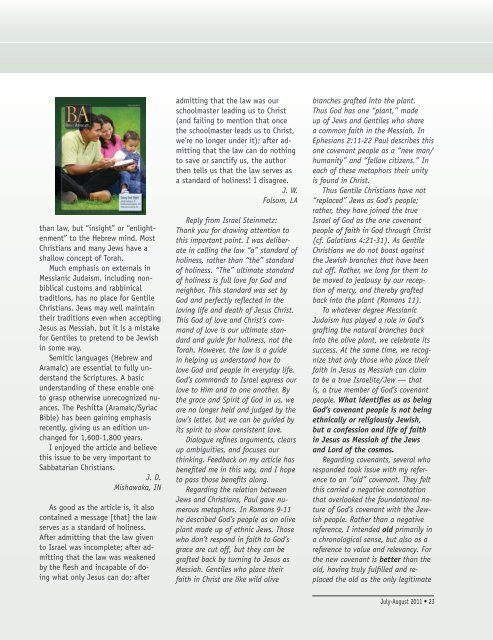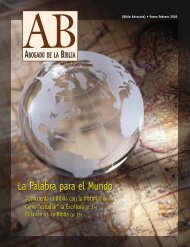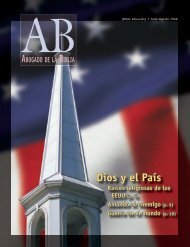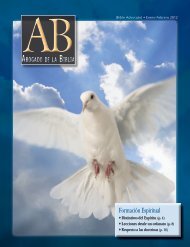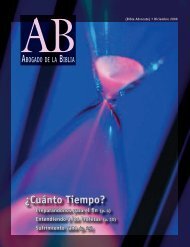English PDF - The Bible Advocate Online
English PDF - The Bible Advocate Online
English PDF - The Bible Advocate Online
You also want an ePaper? Increase the reach of your titles
YUMPU automatically turns print PDFs into web optimized ePapers that Google loves.
than law, but “insight” or “enlightenment”<br />
to the Hebrew mind. Most<br />
Christians and many Jews have a<br />
shallow concept of Torah.<br />
Much emphasis on externals in<br />
Messianic Judaism, including nonbiblical<br />
customs and rabbinical<br />
traditions, has no place for Gentile<br />
Christians. Jews may well maintain<br />
their traditions even when accepting<br />
Jesus as Messiah, but it is a mistake<br />
for Gentiles to pretend to be Jewish<br />
in some way.<br />
Semitic languages (Hebrew and<br />
Aramaic) are essential to fully understand<br />
the Scriptures. A basic<br />
understanding of these enable one<br />
to grasp otherwise unrecognized nuances.<br />
<strong>The</strong> Peshitta (Aramaic/Syriac<br />
<strong>Bible</strong>) has been gaining emphasis<br />
recently, giving us an edition unchanged<br />
for 1,600-1,800 years.<br />
I enjoyed the article and believe<br />
this issue to be very important to<br />
Sabbatarian Christians.<br />
J. D.<br />
Mishawaka, IN<br />
As good as the article is, it also<br />
contained a message [that] the law<br />
serves as a standard of holiness.<br />
After admitting that the law given<br />
to Israel was incomplete; after admitting<br />
that the law was weakened<br />
by the flesh and incapable of doing<br />
what only Jesus can do; after<br />
admitting that the law was our<br />
schoolmaster leading us to Christ<br />
(and failing to mention that once<br />
the schoolmaster leads us to Christ,<br />
we’re no longer under it); after admitting<br />
that the law can do nothing<br />
to save or sanctify us, the author<br />
then tells us that the law serves as<br />
a standard of holiness! I disagree.<br />
J. W.<br />
Folsom, LA<br />
Reply from Israel Steinmetz:<br />
Thank you for drawing attention to<br />
this important point. I was deliberate<br />
in calling the law “a” standard of<br />
holiness, rather than “the” standard<br />
of holiness. “<strong>The</strong>” ultimate standard<br />
of holiness is full love for God and<br />
neighbor. This standard was set by<br />
God and perfectly reflected in the<br />
loving life and death of Jesus Christ.<br />
This God of love and Christ’s command<br />
of love is our ultimate standard<br />
and guide for holiness, not the<br />
Torah. However, the law is a guide<br />
in helping us understand how to<br />
love God and people in everyday life.<br />
God’s commands to Israel express our<br />
love to Him and to one another. By<br />
the grace and Spirit of God in us, we<br />
are no longer held and judged by the<br />
law’s letter, but we can be guided by<br />
its spirit to show consistent love.<br />
Dialogue refines arguments, clears<br />
up ambiguities, and focuses our<br />
thinking. Feedback on my article has<br />
benefited me in this way, and I hope<br />
to pass those benefits along.<br />
Regarding the relation between<br />
Jews and Christians, Paul gave numerous<br />
metaphors. In Romans 9-11<br />
he described God’s people as an olive<br />
plant made up of ethnic Jews. Those<br />
who don’t respond in faith to God’s<br />
grace are cut off, but they can be<br />
grafted back by turning to Jesus as<br />
Messiah. Gentiles who place their<br />
faith in Christ are like wild olive<br />
branches grafted into the plant.<br />
Thus God has one “plant,” made<br />
up of Jews and Gentiles who share<br />
a common faith in the Messiah. In<br />
Ephesians 2:11-22 Paul describes this<br />
one covenant people as a “new man/<br />
humanity” and “fellow citizens.” In<br />
each of these metaphors their unity<br />
is found in Christ.<br />
Thus Gentile Christians have not<br />
“replaced” Jews as God’s people;<br />
rather, they have joined the true<br />
Israel of God as the one covenant<br />
people of faith in God through Christ<br />
(cf. Galatians 4:21-31). As Gentile<br />
Christians we do not boast against<br />
the Jewish branches that have been<br />
cut off. Rather, we long for them to<br />
be moved to jealousy by our reception<br />
of mercy, and thereby grafted<br />
back into the plant (Romans 11).<br />
To whatever degree Messianic<br />
Judaism has played a role in God’s<br />
grafting the natural branches back<br />
into the olive plant, we celebrate its<br />
success. At the same time, we recognize<br />
that only those who place their<br />
faith in Jesus as Messiah can claim<br />
to be a true Israelite/Jew — that<br />
is, a true member of God’s covenant<br />
people. What identifies us as being<br />
God’s covenant people is not being<br />
ethnically or religiously Jewish,<br />
but a confession and life of faith<br />
in Jesus as Messiah of the Jews<br />
and Lord of the cosmos.<br />
Regarding covenants, several who<br />
responded took issue with my reference<br />
to an “old” covenant. <strong>The</strong>y felt<br />
this carried a negative connotation<br />
that overlooked the foundational nature<br />
of God’s covenant with the Jewish<br />
people. Rather than a negative<br />
reference, I intended old primarily in<br />
a chronological sense, but also as a<br />
reference to value and relevancy. For<br />
the new covenant is better than the<br />
old, having truly fulfilled and replaced<br />
the old as the only legitimate<br />
July-August 2011 • 23


